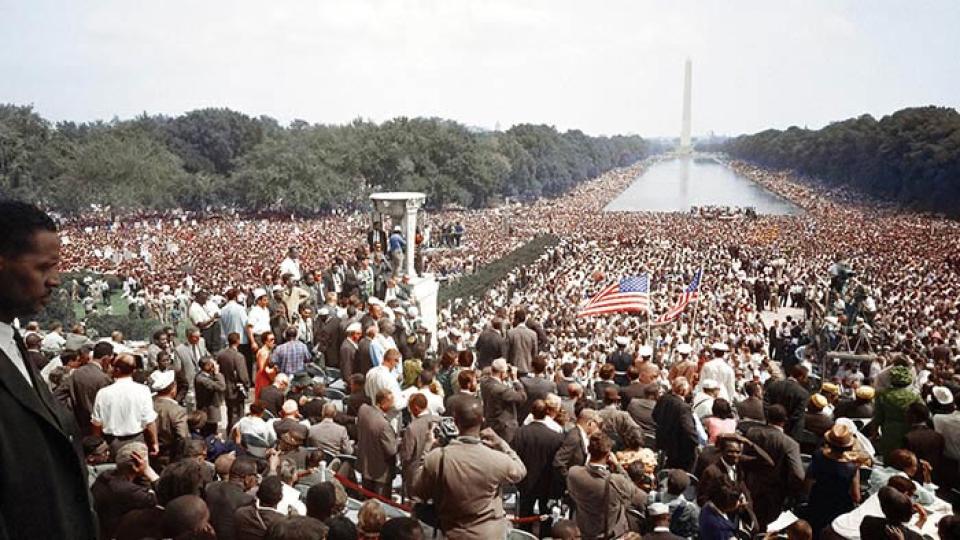1963 March on Washington
Lyda Peters was 19 when she attended the now famous March on Washington where Martin Luther King, Jr. delivered his “I have a dream” speech. She recalls the event, especially the emotions and energy of the event, vividly.
Neither she nor anyone in her family were activists. “My mom and my aunts, we were just working people in New York.”
Her aunt received two tickets to the March from a friend who couldn’t go because of work. She asked Lyda if she wanted to go. Lyda recalls the train ride from New York to Washington, "There was such excitement. People were even sitting on the floors. They started singing. They were happy. People were talking to strangers, telling stories. And at every stop more and more people got on the train.” She joined in the singing.
When the train stopped in D.C., they disembarked. She was awed to see the flood of people getting off other trains and buses. “They kept coming and coming and coming,” she explains. “It was very crowded and people were singing outside too. We were all holding hands with people we didn’t know. It was almost like a religious experience. You never forget a moment that touches you like this. I began to feel like I was part of something special.”
They followed the crowd to the March. People were sitting under trees and even in trees. Lyda and her aunt were too far back to be able to hear King or the other speakers. But she was happy and proud to be there. It affected the course of her life.
“Being at the March moved me into a direction that stayed with me for years,” says Lyda. “It was foundational and was added to all my previous life experiences of being Black and raised by a single mother in New York.”
“When we moved to Boston, I saw all the storefront community agencies where some of my friends volunteered. They were working on justice in the education system,” she recounts. “As I continued to process all my life experiences, I felt compelled to get involved. I wanted to be involved in civil rights and social justice and improving the world. I began working for Ruth Batson and I became part of the movement in Roxbury that was changing the schools.”
Ruth Batson was a civil rights activist who challenged the Boston School Committee over racial segregation and inequalities. She held many impressive roles over her lifetime. In the mid-60s, she was chairwoman of the Massachusetts Commission Against Discrimination and she helped launch the Metropolitan Council for Educational Opportunity (METCO) voluntary desegregation program. As a member of the leadership team, she helped grow METCO from transporting 225 black urban children to several suburbs to 1,125 children to 28 communities.
“Ruth was a profound person. She pushed to make things right for underserved groups,” says Lyda.
Ruth was recruited to run a consultation education program at Boston University Division of Psychiatry. She took Lyda with her as director of training. Lyda worked nights teaching at Cambridge College, along with this full-time job. Cambridge College was known as an innovative college that was helping people in the community get degrees. Lyda explains, “It was for working adults who may or may not have had undergraduate degrees but who were contributing in some way to their community. Cambridge College was a champion for social justice. I liked the idea of that.”
“We learned about each student’s life and strengths and helped them understand what their role was in the community and how they could change things for better. Students who came here were individuals who understood poverty. They understood children who were neglected. They understood mental health disease.”
“Our students had unique experiences and they worked on behalf of others,” Lyda went on. “They were individuals working against segregation or they were activist teachers who could tell you stories of what they had to do and what they went through in order to protect kids or teach kids in the way they deserved. We tapped into their knowledge and experiences in the curriculum.”
“I shared my philosophy with them of a rock in a lake. You can throw a rock in a lake and the ripples will extend out a good distance. But if you work as a group and throw 100 rocks in a lake, your impact will be much greater. It’s important to join with like-minded people to protest, to gather money, to help other people. A group can have a major impact on society.”
Bringing it full circle, Lyda states, “If you have a belief that things can change and that there’s a greater good, an experience can change your life. The beginning of that change for me was the March on Washington.”
Lyda was interviewed for the USA TODAY article, “‘Tell ’em about the dream, Martin!’: Memories from the crowd at MLK’s March on Washington” published on August 24, 2023.

